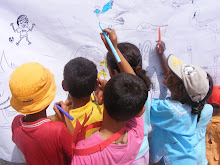 Looking from the port across the river Lixus towards the beach
Looking from the port across the river Lixus towards the beach
The port as seen from its entrance
In order to understand Larache you have to know that it all begins with the port. It’s a place where a boy of 15, who never cared much for studying, can find work and dreaming of squid, shrimp, and lobster find his way to what seems like “easy money”.
The fish industry here employs about 5000 people, from the one who drives the motorcycle that moves the fish around, to the ice seller, to the one that collects enough scraps off the boat docks until he can sell a kilo the hungry passerby.
There used to be five factories here. They have all since closed down. The port is the last remaining gold rush here in the city. Anyone can come down with twenty bucks, buy kilos of fish, and make enough to sit in his favorite café, drink coffee and pass the afternoon smoking hashish, and doing the best a poor boy can do to look nice for the the ever so materialistic ladies on parade. Waking up the next day its back to the port to do it all again the next day.
For those of a more brave nature, they can take to the sea. One week of work can take in 600 dirhams depending on the quantity and the quality of the fish they bring in. The life of the fisherman is not an easy one and it is what gives Larache its rough flavor.
Now with few work opportunities the city is completely dependent on the fishing industry and money sent from relatives abroad to survive. For this the dream of joining those on the outside everyday grows stronger and stronger. Its rare that a young person here would tell you that he wouldnt leave behind everything just for one shot to make it to Europe.
So... the way to salvation always leads perilously through the sea.
You can tighten your belt and head out for a hard days work on a fishing boat


All roads lead out to the sea
… Or for those more adventurous and ill-fated you can take out a loan of about 1000 dollars and pay your way across the Mediterranean in a tiny little dingy boat trying to reach what must seem like the other side of the world, in order to take your place among the many others from the poorer parts of the world trying to risk and chance their way to a better life.
The special thing about Larache is the fact that its a place that has a charm that is a bit rough around the edges. Here, just outside of the tourists zone is where you will find both the undiscovered charm of a place out of the reach of tourist buses and big hotels but at the same time you will find yourself also confronted with the harsh reality of a Morocco that makes no effort to coddle you and pull in your tourist dollars. In fact life can be quite hopeless for many of the young people here as many of them cant seem to find their way out of a maze of alcohol, drug abuse, and the street life. Indeed, any visitor can easily see that things in Larache are in stark contrast to the way the country is presented to the ten million visitors that the Moroccan government hopes to welcome here by the year 2010.
Sure a donkey or a little girl fetching water are picturesque for those coming from outside Morocco. But for a grown man with five children earning 5 dollars a day, it’s just a cold, harsh reminder of the way things are.
During my entire first year here in Larache I was amazed at the poor condition and the at times scandalous language and behavior of the people when compared with other cities that I know here. I couldn’t understand the depilated and rough appearance of the city and its people after knowing well the luxury and pictureistic beauty of the well known tourist spots. But the day I returned to the city, walking back from the port, it finally all clicked. I realized that part of the beauty of this place is that fact that it is in a sense REAL. For the first time, looking through my new perspective, it all didn’t look so bad. The faces were recognizable, the language only half as vulgar as the port, and the city while it may not smell or look so pleasant for the new visitor, after leaving the world of the port and a hard days work behind you, my goodness … It all seemed very relaxing and pleasant indeed.





No comments:
Post a Comment